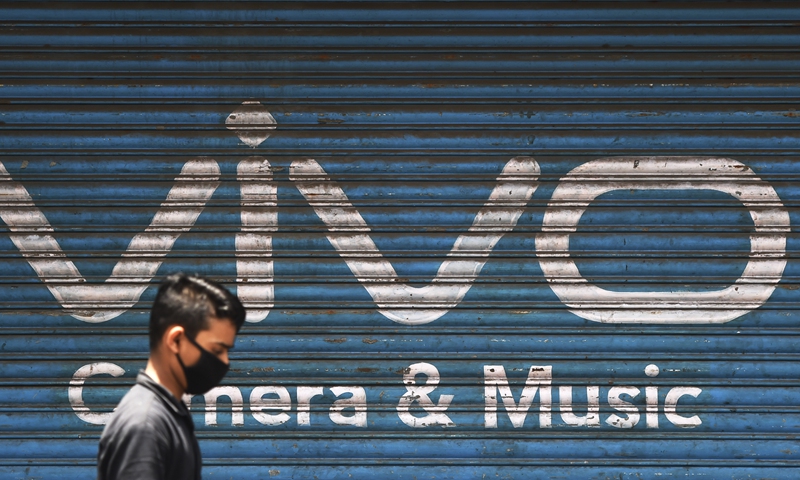Chinese phone brands prevailing in India
By GT staff reporters Source: Global Times Published: 2020/7/22 22:28:05

A man walks past an advertisement of Chinese mobile phone maker VIVO, in Mumbai on June 22. Photo:AFP
Chinese phone brands have honed skills to such an extent that it may take at least a decade for them to see a viable challenge from an Indian smartphone manufacturer, an executive of a Chinese smartphone maker said.
The comment came as Chinese smartphone brands plowing the India market reported expansion of market share there, despite rising Indian noises to boycott Chinese products, following a bloody border brawl on June 15 between Indian and Chinese border troops.
Smartphone shipments in India fell 48 percent to 17.3 million units in the second quarter ending June, amid the COVID-19 pandemic and lockdowns, according to research firm Canalys on July 17.
However, the four leading Chinese smartphone makers - Xiaomi, Vivo, Oppo and Realme - together held a bigger market share, at 75.1 percent of total shipments, rising from the 66.1 percent they held in the same period in 2019.
While India's indigenous phone vendor and other foreign brands, notably South Korea's Samsung, tried to harness the current winds to expand their market share in the Indian market, Chinese industry insiders said such efforts would not pose much of a challenge to the market dominance enjoyed by Chinese phone makers.
An industry insider, an executive at a leading Chinese smartphone brand in India, compared making phones to making cars.
"On the surface, you piece together parts provided to you by your suppliers and you get the final product ready for sale. But deep down, it is about honing the integrated industrial chain to the level of perfection. And not everyone can do this," the insider told the Global Times Wednesday.
"This skill alone requires 10 years of learning if Indian companies are serious in their ambition to challenge Chinese venders," noted the executive, who declined to be named.
Besides the core competitiveness, Chinese brands tend to invest heavily in local branding and marketing channels, bringing most value to Indian consumers.
Rivals including Samsung, Nokia, or even Apple, are hardly price-competitive, the Canalys research note reads.
An India-based Chinese businessman surnamed Li told the Global Times Wednesday that nearly all his Indian suppliers use Chinese-brand smartphones and they showed little interest in boycotting inexpensive and quality Chinese products.
"Some Indians are eager to fan the sentiment of boycotting Chinese smartphones, but if you look carefully, those people have an iPhone or Samsung phone in their hands, which are not affordable for everyone," Li said.
"For the vast majority of Indians who pursue high performance with low costs, their natural choice is buying a Chinese-brand."
Still, foreign smartphone manufacturers are keen to increase their stakes in the Indian market under the current situation.
Following the call by India's Confederation of All India Traders to boycott Chinese goods, South Korea's Samsung has reportedly increased its budget phone offerings.
Taipei-headquartered Foxconn, which makes Apple products, is reportedly mulling plans to invest $1 billion to expand a factory in southern India, Reuters reported on July 11.
"We haven't been affected [by the boycott] at all," the insider said. "Actually, we are short of supplies due to very brisk sales."
But the insider said his company faces hurdles by Indian custom authority's stalling tactics at ports and the spreading pandemic, which kept rural Indian workers away from manufacturing plants in cities.
The Jio Phone by Indian billionaire Mukesh Ambani, chairman of conglomerate Reliance Industries, is unable to challenge Chinese brands, as it focuses on a lower pricing market segment, experts said.
Newspaper headline: ‘Boycott China’ move failing
Posted in: INDUSTRIES,COMPANIES